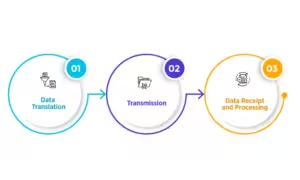What is Electronic Data Interchange (EDI)?
Like the name, EDI is an interchange of documents between two electronic devices likely to be computers between two business partners in a standard electronic arrangement. Today, businesses require efficient communication tools to streamline operations. One such tool is Electronic Data Interchange (EDI), a system that enables the exchange of business documents between companies in a standardized electronic format. By replacing traditional paper-based communication, EDI has revolutionized business processes, enhancing speed, accuracy, and security.
Meaning and Its Importance as a Communication Tool
Electronic Data Interchange (EDI) is the automated exchange of business information between different organizations using a standardized electronic format. It allows companies to send and receive critical documents such as purchase orders, invoices, shipping notices, and payment confirmations electronically, eliminating the need for physical paperwork.
Instead of relying on emails, faxes, or postal services, businesses use EDI to send structured data directly into their partner’s systems. This seamless integration reduces manual data entry, minimizes human error, and speeds up transaction times.
How Does EDI Work?
EDI operates through a set of globally recognized standards that determine how information is structured for transmission between companies. These standards, such as ANSI, EDIFACT, and TRADACOMS, ensure that the data exchanged is consistent and easily interpreted by different systems.
Here’s a simplified breakdown of the EDI process:
- Data Translation: Information from a business document is translated into an EDI format using specialized software.
- Transmission: The formatted data is securely transmitted through an agreed-upon communication channel, such as AS2, FTP, or VAN (Value-Added Network).
- Data Receipt and Processing: The receiving system decodes the EDI message and integrates it into its internal processes without human intervention.
This automation helps streamline the flow of information across supply chains, improving overall business efficiency.
The Importance of Electronic Data Interchange (EDI) in Modern Business
As businesses grow and global trade expands, the need for reliable and efficient communication tools becomes essential. Electronic Data Interchange (EDI) serves as a critical solution to meet these demands, offering a range of benefits that make it an indispensable tool for companies of all sizes.
- Increased Efficiency and Speed
One of the main advantages of EDI is the speed at which transactions occur. By automating the exchange of documents, businesses can send and receive important information in seconds, allowing for faster order processing, invoicing, and payment confirmations. This efficiency is particularly crucial in industries such as manufacturing and retail, where supply chain speed can impact profitability.
- Cost Reduction
With EDI, companies can significantly reduce their operational costs. By eliminating paper-based processes, businesses save on printing, postage, and storage expenses. Additionally, automation decreases the need for manual data entry, reducing labor costs and minimizing errors that could lead to expensive corrections or delays.
- Improved Data Accuracy
Manual data entry is prone to human error, which can result in costly mistakes. Electronic Data Interchange (EDI) eliminates this risk by automating the exchange of information. With no need for manual intervention, companies can ensure that the data transmitted is accurate and reliable, leading to fewer errors in orders, invoices, and other critical documents.
- Enhanced Security
Security is a key concern for businesses handling sensitive information. EDI provides a secure platform for data transmission, ensuring that critical documents such as contracts, invoices, and financial statements are protected from unauthorized access. Advanced encryption methods and secure communication protocols help safeguard business transactions.
- Stronger Business Relationships
EDI strengthens business relationships by fostering seamless communication between partners. Faster transactions, fewer errors, and real-time updates allow companies to build trust and reliability. As a result, businesses that use EDI often experience better collaboration and long-term partnerships with their suppliers, customers, and other stakeholders.
- Compliance with Industry Standards
Many industries, particularly healthcare, retail, and logistics, have adopted EDI as a standard communication tool. Companies that use EDI not only streamline their own operations but also ensure compliance with industry regulations and requirements. This compliance is often a prerequisite for working with larger corporations and government agencies.
Key Applications of Electronic Data Interchange (EDI)
EDI is widely used across various industries to simplify and enhance communication processes. Some of its key applications include:
Supply Chain Management: EDI allows businesses to share inventory data, track shipments, and manage purchase orders with ease.
Healthcare: Hospitals and insurance companies use EDI to exchange patient records, billing information, and claims in a standardized format.
Retail: Retailers use EDI to automate the ordering process, manage stock levels, and streamline payments with suppliers.
Logistics: EDI helps logistics companies share shipping information, track deliveries, and improve coordination across global supply chains.
Conclusion
In an era where digital transformation is shaping the future of business, Electronic Data Interchange (EDI) plays a vital role as a communication tool. Its ability to automate document exchange, improve accuracy, enhance security, and reduce costs makes it indispensable for businesses across all sectors. Whether you are managing a supply chain, processing payments, or coordinating shipments, EDI ensures that your transactions are efficient, secure, and error-free, helping you maintain a competitive edge in the marketplace.
Read More: Natural Language Processing: The Future of Communication


